Your donation will support the student journalists of North Cobb High School. Your contribution will allow us to purchase equipment and cover our annual website hosting costs.
The most common silently suffered illness in the world
May 7, 2015
Everyone deals with anxiety. The difference, however, between everyday nerves and anxiety disorders revolves around what the triggers are, where they strike, why they occur, and how they affect people.
The dictionary defines anxiety as a feeling of worry, nervousness or unease about an imminent event or outcome. If someone asked a person with anxiety to define the word, they would receive endless different answers. Anxiety is not a single, concrete sensation. Everyone experiences this issue differently. We can however, group anxiety into five main disorders: Generalized Anxiety Disorder, Obsessive Compulsive Disorder, Panic Disorder/Agoraphobia, Social Anxiety, and Posttraumatic Stress Disorder. For more information about each disorder, refer to the infographic below.
While the symptoms and characterizations of these disorders provide a look into the world of anxiety, they fail to give a real sense about what living with anxiety on a daily basis feels like. To give a sense of what life with anxiety looks like, several interviews were conducted with students from around NC.
These are their stories.
“The Ice Man”
Senior Sabrina Kerns struggles with social anxiety each day, but underneath her anxiety, there is a funny personality waiting to come out.
Sabrina Kerns, a 18 year old senior, self-diagnosed herself with social anxiety at the beginning of high school. Most people develop social anxiety around age 13. Based on when she diagnosed herself, Sabrina follows this trend.
Kayley Rapp (Interviewer): When did you realize you had a problem?
Sabrina Kerns: I’ve always known that there was something wrong, but up until I started learning more about anxiety in the 8th grade I always just shrugged it off as a severe case of “shyness.” After I was almost kicked out of pre-school for not speaking, my mother started introducing me to her friends as her “incredibly shy” child, so I knew from a young age that there was something different about me.
KR: How do you manage your anxiety?
SK: I still have not found a wonderful method for managing my anxiety. I mostly try to stay away from situations that make me feel uncomfortable or anxious, which, I know can be unhealthy at times. I also try to prepare for upcoming situations that I know will make me uncomfortable.
KR: Does anyone in particular help you manage your anxiety?
SK: I don’t have anyone in particular that helps me manage my anxiety, but talking with friends helps a lot!
KR: Triggers can be difficult to explain, but what triggers your anxiety the most?
SK: I think that would be when someone puts me in a weird situation without warning. Unsuspected notes from the office saying a have a meeting with my counselor. Anyone asking if they can “talk with me for a second.” Last Christmas, I had to go to a party with my uncle in which I did not know anyone. At one point in the evening, he asked if we could talk in the dining room for a few minutes, and we ended up talking about my college plans in a room full of strangers. The night ended with me having a panic attack in front of this distant uncle that I talk to maybe once and year and him calling my mom and telling her that there is something “very wrong” with me.
KR: So if social situations trigger your anxiety, how do you calm it?
SK: Sometimes I write everything down in a journal. It might not always be necessarily emotions, but sometimes I just describe the tightness in my chest or the sound of my heart beating in my ears. For some reason this works for me, but I have heard of it making some people even more anxious. Sometimes I count down from one hundred and focus on my breathing. Once I watched a spoken word poem about social anxiety, (“Social Anxiety at 130 IBM”) and it was about this boy at a party with all of these people that don’t know him. So he wants to act like someone else. He wants act cool. He wants to be “the iceman.” Sometimes when I feel really anxious, I think to myself “You’re not being the ice man anymore,” and it actually helps. I don’t know why this works.
KR: What is one misconception about anxiety you would like to change?
SK: Many believe that people with anxiety should just avoid whatever makes them anxious altogether. That is extremely unhealthy! I can’t go all my life without communicating with people!
Sabrina choose to contact the interview over email because of her social anxiety. This simple act illustrates how anxiety affects simple, everyday actions.
Simply Avoiding Their Triggers
Many anxious people hear this common question from others: “If that makes you so anxious, why not simply avoid it?” If avoiding their triggers were that simple, they would simply avoid them altogether. Unfortunately, life remains more complicated than that.
Anxiety sufferers cannot avoid their triggers altogether. Not only is that extremely unhealthy, their triggers are often found within their everyday lives. A boy with social anxiety may find himself required to speak up in class everyday. A girl with PTSD may pass by the place of her incident everyday. People cannot block everything uncomfortable from their lives. Despite the discomfort, they must eventually face their triggers and learn to live with them.
“Talk until I’m unconscious”
Senior Shelby Scuzs does not allow her anxiety disorder to change who her. She works hard each day to keep going.
Shelby Scuzs, 17 year old senior, received her diagnosis from a doctor at Ridgefield Hospital last year. Shelby’s doctor diagnosed her with Generalized Anxiety Disorder, and for the past year, she has learned to cope with her anxiety.
KR: When did you realize you had a anxiety?
Shelby Scuz: I knew when I was really young because I got so nervous whenever I tried to talk to anyone. I had the privilege of being able to talk until I’m unconscious, so I basically talked until people liked me. I would become nervous about random things. I talk to my dad on the phone a lot when I was younger. Whenever he called, I would get super nervous because I’m terrible on the phone. Sometimes I get embarrassed when I need to ask teachers for help. I don’t know if that’s anxiety or just normal?
KR: I think that might be both.
SS: I don’t know. Just…things most people usually let wash over them or fade away, I would because super nervous about. That’s how I know.
KR: How do you manage your anxiety? I think you told me once you are on medication of some sort.
SS: I take Prozac. Which is apparently an antidepressant, but it works for anxiety too.
KR: A lot of antidepressants are anti-anxiety medications too. They have double duty. So, do you have someone who helps you deal with your anxiety?
SS: Sometimes I talk to my friend Andres. He understands me.
KR: What is the best technique you have for calming your anxiety?
SS: For me, talking a lot helps because I can just talk about random things to distract myself. I can just go on for hours to distract myself. I don’t even have to be talking to someone. I can just talk to myself, which I know makes me sound crazy. I just feel like talking it out makes it better.
KR: So basically you need to vocalize how you feel to feel better?
SS: Yeah. Basically.
KR: What triggers your anxiety?
SS: Ah…school. Seeing family too, just because I don’t see them often. They are always asking questions. “How’s school? What college are you going too?” Stuff like that.
KR: How do you know your anxiety is flaring up? Or rather, how do you know you’re going to have a panic attack?
SS: Panic attacks for me are different from general anxiety attacks. Anxiety is feeling really nervous. I start shaking a little. It becomes a little hard to breathe. Sometimes when I get really anxious, my legs start to feel really cold. I don’t understand why. It just feels like they’re freezing all of sudden. That’s when I know it’s flaring up. It’s one thing to me nervous about say, a class assignment or a presentation. It’s another thing to be up at night, thinking in the shower to yourself, “Oh my God. How am I going to do this?” Then a panic attack for me is shaking, hyperventilating, crying, needing to breathe into a bag. I can definitely tell the difference between the two.
KR: So how do you handle the panic attacks?
SS: I have only had a few panic attacks. Since my little brother has always been there during them, he helps me out. He will get my a bag to breathe into. I kind of…I don’t want to say ride it out, but there is nothing you can do to cut the attack short. You sort of just let it happen. The attacks usually last 15 minutes.
KR: What’s a misconception about anxiety you would like to change?
SS: Everyone knows the Zooey Deschanel stereotype. I don’t mean to peg at Zooey Deschanel, but the way the stereotype presents anxiety is like, “Oh! Look at me! I have anxiety! I hate talking to people. It’s cute!” But for other people, with extremely bad social anxiety, it’s like “I feel like I’m going to throw up whenever I talk to someone.” There is such a difference between being quote unquote quirky and having actual anxiety.
The Quirky “Anxious” Girl Archetype
Hollywood tends to present only certain archetypes in media, especially when it comes to female characters. Only one popular female archetype manages to show anxiety in any shape or form: the Quirky Girl. For those unsure what the Quirky Girl looks like in media, think of every character Zooey Deschanel ever played. This archetype possesses problems beyond the unrealistic representation of anxiety, but the main issue with sufferers remains with the archetype’s ability to invalid their experiences.
The Quirky shows anxiety as something adorable and endearing. They call her “OCD” if she overcleans her apartment, or call her awkward social skills “social anxiety.” The worst she endures are muttered conversations with love interests, or stammered meetings at work when she loses confidence. Neither of these scenarios show how difficult anxiety makes life. In a world that already disrespects anxiety sufferers’ struggles, the Quirky Girl presents unrealistic ideas of what anxiety looks like.
“That makes me freak out”
Junior Melissa Hines remains bright, brave, and bubbly despite her depression and anxiety.
High school junior Melissa Hines lives with anxiety and depression everyday, but with her bright smile and unique laugh, no one would ever know it.
KR: What kind of anxiety do you have?
Melissa Hines: Well, I have anxiety and depression. My anxiety acts up when I get really frustrated and stressed out.
KR: Did you diagnose yourself with anxiety and depression, or did a doctor tell you?
MH: I was diagnosed by a doctor…sophomore year. I have been taking antidepressants and antianxiety medications since then.
KR: When did you first realize you had any anxiety or depression issues?
MH: Well…[I realized my] depression when my entire day was sad and was only happy every once and awhile. Because it’s supposed to be the opposite way. Be happy, and then once and awhile you’re sad. Anxiety…I found that out when I started to have really bad asthma attacks, or so I thought. Then I realized it wasn’t asthma. I was just me freaking out and having trouble breathing.
KR: So you were having panic attacks probably?
MH: Yes.
KR: How do you manage your anxiety and depression? I know you said you take medications, but do you do anything else to help?
MH: I try to recognize my triggers and stay away from them, so that I don’t have any panic attacks or depression issues.
KR: Do you have someone, a parent, friend, or a counselor, who helps you deal with your issues?
MH: Probably my youth pastor at my church. She was a big help with that [my anxiety and depression]. So is my sister and my dad. My sister would keep me accountable for anything I would do. She would make sure I wasn’t physically harming myself or anything like that, so she kept me in shape.
KR: What is the best thing you have found to help keep you calm and happy in your case?
MH: I think one thing is to keep thinking about how good my situation is instead of how bad it is. There are people you have life way worse than I do. Thinking about that makes me realize I am not in as such a bad situation as I think I’m in.
KR: What triggers your anxiety and depression the most?
MH: I would have to say it is probably when people ask me if I’m okay. That is probably the worst thing ever. The other thing would be when I’m in trouble or if someone tells me I did something wrong. That makes me freak out.
KR: How do you know your anxiety and depression are flaring up, or that you’re going to have a panic attack?
MH: I will start to feel like I need to cry, and I will have to grit my teeth in order to not cry. I just tense up and sit there like “Oh my Gosh!” Then people ask you if you’re okay, and then it’s like bam. Panic attack.
KR: Since you do experience panic attacks, how do you handle them?
MH: Normally, I have someone to come help me. I don’t know what I would do if I was alone and had a panic attack. My friends try to help me breathe with them. So they will breathe really slowly and say “Breathe with me.” I will try to calm my breathing. I get afraid that I’ll start to hyperventilate if I don’t. A lot of the times, it is just trying to remain calm and think happy thoughts.
KR: Finally, what is one misconception about anxiety and depression you would like to change?
MH: That…it is all in our heads or that it is all our fault. Whenever I talk about it to people, they will say “I don’t understand why they are making themselves so sad.” It is not us making ourselves sad! It is just naturally whatever hormones in our bodies that are making our bodies react this way. It’s just there. It’s a condition. You can’t stop it.
An Everyday Struggle
Often non-anxiety sufferers fail to understand that anxiety as a mental health condition, never goes away. Anxiety (or in Melissa’s case, depression too) is an everyday struggle that affects every part of our lives. No one pretends to feel anxious around social situations, and no one fakes panic attacks. We cannot completely control our problem, and we are not seeking attention.
Contrary to popular belief, no one grows out of anxiety. Similar to addiction and alcoholism, once anxiety overcomes us, we are stuck with it for the rest of our lives. While the type of anxiety may change or evolve, we never rid of it. We are simply try to live our lives with this mental illness.
“Drawing on Everything”
Senior Sophia Mackey, known for her feminism and art, deals with Generalized Anxiety Disorder everyday.
17 year old senior Sophia Mackey found herself living with Generalized Anxiety Disorder, but found a way to use her creativity to conquer it. Instead of constantly worrying, she channels her worry into her art.
KR: You said you were not quite sure what kind of anxiety you had. Were you self-diagnosed?
Sophia Mackey: Kind of. I have seen a therapist, and they have told me I have anxiety problems. However, it wasn’t bad enough that I had to go see a psychiatrist.
KR: When did you realize you had a problem?
SM: Probably freshman year. Just because it was freshman year when I was going crazy. Freshman year is a mess. There’s a lot that went down that doesn’t have to do with my anxiety. Still. Freshman year is just a blur of emotions.
KR: How do you manage your anxiety?
SM: Whenever I get extremely anxious, I draw. I will find anything. I don’t even care. I will draw on a piece of toilet paper or something. I usually start tapping tapping a lot.
KR: Is there a particular person that helps you manage your anxiety?
SM: No. Literally no one. It’s a self thing. I have to do it myself. I don’t like when people are like,“Just calm down.” Whenever I’m anxious, I just need everyone to go away immediately or I go crazy. I start crying.
KR: What’s the best technique who have found to calm yourself down?
SM: To either A: draw, or B: to remind myself I will be asleep later.
KR: What triggers your anxiety the most?
SM: Oh my gosh. This is going to be a small (read large) list. I have never been more anxious than when I meet a celebrity. It’s a mess! It could be the middle of winter, I will immediately become the sweatiest person on planet Earth. I just start shaking. For some reason whenever I’m going to take a shower before bed, that makes me really anxious. Whenever I’m near someone I find even slightly attractive, I’m anxious. Even if I’m just like, “Wow. They could be somewhat attractive if they were my type.” I’m a mess.
KR:When have you been able to be anxious about a celebrity?
SM: Whenever I go to concerts and they’re there afterwards, I can’t. I just can’t.
KR: But you’re here in Ms. Kovel’s room and they are basically in the lunchroom!
SM: I went to a Temples concert. The lead singer was right there, and I was with Jordan Grubb. She kept telling me to go say hi to him, and I just could not. Jordan just kept telling me to do it, so finally I decided I was never going to see this godly person again anyway. I finally went up to him, and I had a two minute speech planned out in my head. I got up these. I was like, “That was…great…you know…” That was literally what I said. He just said thanks. I knew who they were going on tour with next, so I asked them to tell the other band that I really liked them. Then I ran away. Every Time I have ever met a famous person, it is the exact same thing.
KR: How do you know your anxiety is flaring up, or if you have them, are going to having a panic attack?
SM: Whenever I get abnormally hot, I know I should probably tell myself to calm down. When my hands get really cold but I’m burning up, I know I should remove myself.
KR: How do you handle your panics attacks?
SM: I don’t remember that well, so I guess that means I’ve been doing well lately. I used to go the bathroom and just sit down. I would just blot my face with toilet paper and just sit there and think about how quiet it was. I just remind myself that in a few hours I will be with my cat and asleep. I just remind myself that it will eventually be over.
KR: What is one misconception about anxiety you would like to correct or change?
SM: That anxiety is easily solved. You cannot just tell someone to calm down. That’s not how it works. It’s not like when you get a shot, and you cry because it’s natural. Your parents can’t just tell you to stop being a little brat. Also, it is not your job to fix someone. Give them a moment to breathe. Then try to help if they want help.
A Moment to Breathe
Friends and family members of anxious people often feel responsible for keeping their loved ones calm. If they see their loved ones break into a nervous sweat or actually start to panic, they try everything to ease their loved ones anxiety.
Honestly, anxiety sufferers want the opposite of this happening when they panic. Their minds race, and their bodies practically shut down. They already feel enough inside of them in their panicked state. Seeing their friends or family members panic over them does anything but help. Instead of immediately trying to aid someone in a panic attack, give them a moment to breathe. If they want help, they will ask. Unless they ask however, keep calm and leave them alone.
“The Curveball”
Whether I knew it or not, my experience with anxiety started at a young age. Shortly after my sister’s birth, my mother developed OCD. Hers in particular revolved around germaphobia. I grew up not understanding why I could not touch raw meat, why my mom wore gloves to clean clothes, and why whether or not I washed my hands mattered so much.
When I became older, my mom explained certain aspects of her OCD to me and my sister. Mom refused to let me grow up believing some of her compulsive habits were “normal.” As her OCD lessened, she allowed my sister and I to try things our own way. We could touch raw meat, crack eggs when we cooked, and eventually could live life our own way. Letting go of so much control remains difficult for my mom sometimes, but to this day, she manages to work through her anxiety.
Then came the curveball.
In 2007, at the tender age of seven, my younger sister Shannon developed OCD. Because of my mom, our family understood how to handle this, but only to a point. She was only seven years old. Shannon’s OCD revolved around losing control or something happening to a family member. A few years early, she witnessed her first death in our family when our aunt lost her battle to breast cancer. This presented itself, however, in her fear of storms. She obsessed over any bad weather and hid everything when storms came. At the time, I just entered the fifth grade and could not understand why my sister constantly panicked over storms.
This introduced me to therapy, anti-anxiety medications, and the stigma around both of them.The various details of my sister’s treatment remains her private information. I will say, however, that Shannon started therapy and took two medications for many years. Two facts some of her elementary school teachers choose to ignore. I, innocent little Kayley, could not understand why people thought her sister faked her anxiety disorder. To me, this shows how far the stigma against anxiety disorders goes. Some people cannot even believe a young child.
While I was exposed to anxiety young, I only developed it two years ago. At the beginning of junior year, I became overwhelmed by college prospects , the loss of former friends, marching band, my first ever AP classes, and the start of my newspaper career. At first, I labeled this as meer stress. Junior year is supposed to seem overwhelming and stressful right?
One night while trying to complete my AP Lang homework, I looked down at my work and started sobbing. This went on for three hours. Every so often, I would calm down for five minutes before slowly sinking back into panic. Following this incident, I suddenly could not function properly in public. I became anxious when order food or purchasing items at stores. I could barely speak up in class without crying. Determining I had social anxiety would take awhile, but I eventually learned to cope with it.
Senior year rolled around, and my anxiety remained mostly quiet. An occasional anxious moment came up, but it mostly remained quiet. Then Christmas Break came. One minute I am enjoying my holiday ,and the next, I’m experiencing a panic attack everyday. Somehow, I became obsessed with the idea I could hurt someone. I refused to leave the house and denied my problem until February.
My mom found me a therapist who I have seen for two months now. She helped me cope with these intrusive thoughts and suggested I see a psychiatrist. About a month later, I saw a psychiatrist who diagnosed me with OCD, Panic Disorder, and depression. He prescribed an anti-anxiety medication called Lexapro. After two months on the medication, I see it making a difference in me. From here, I only need hope, like everyone else in this story, just to keep moving forward.


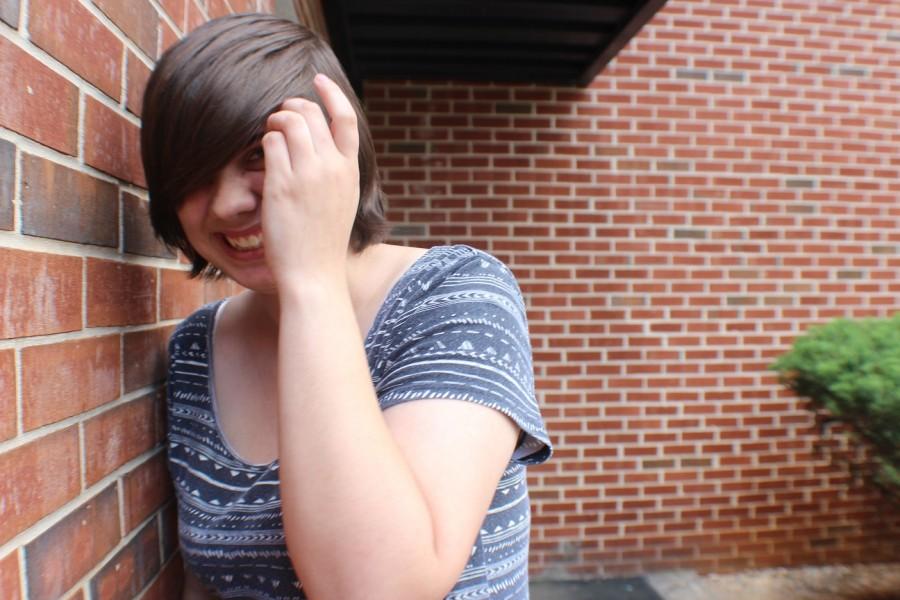
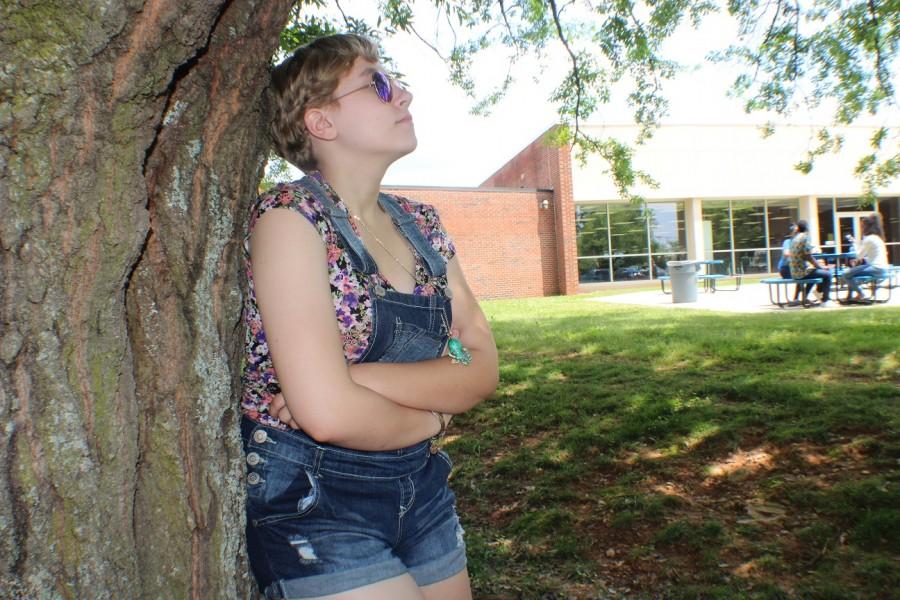
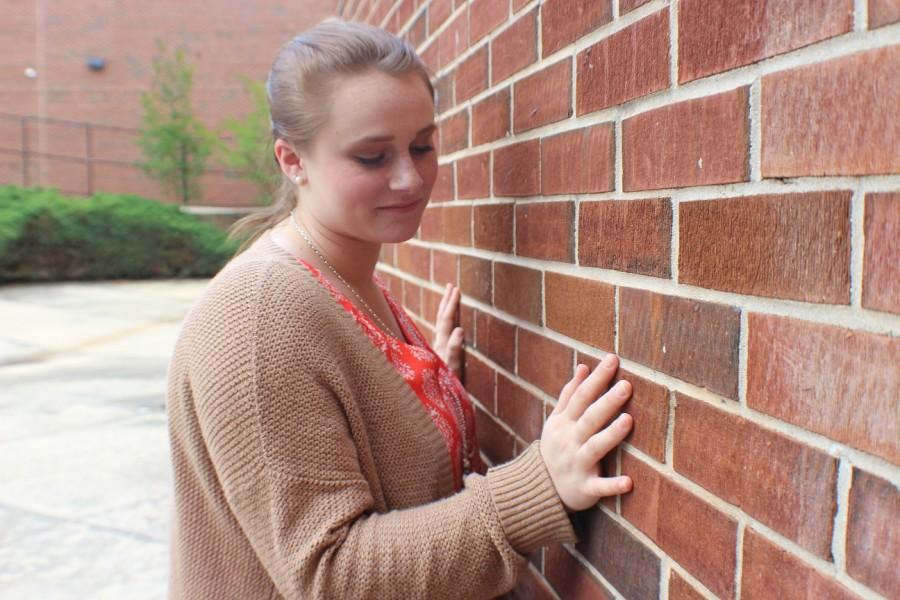
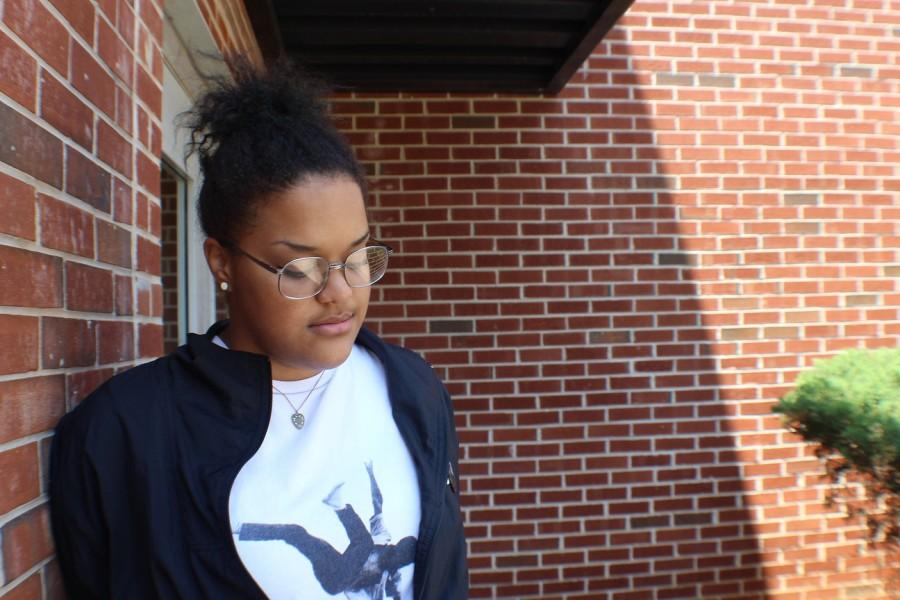
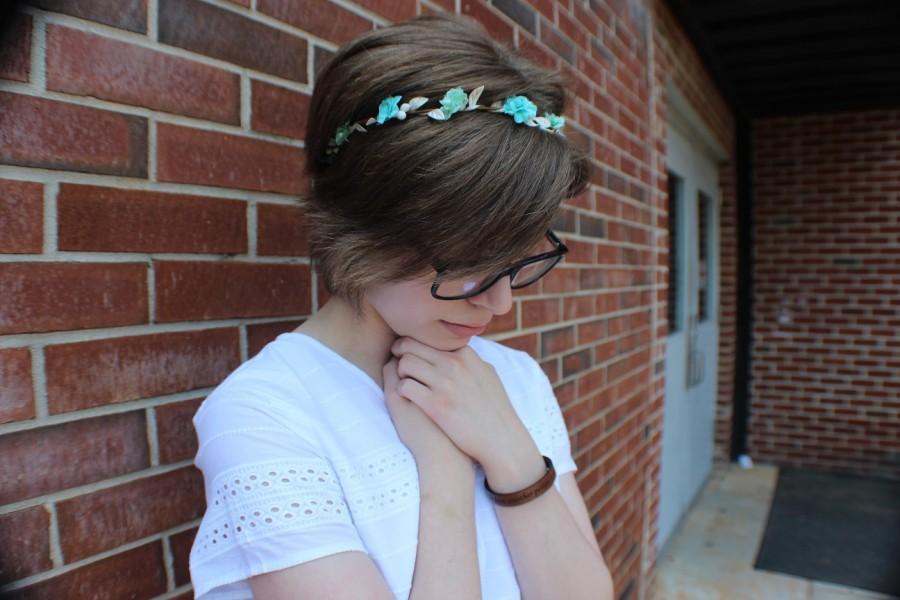
Anita Rapp • May 7, 2015 at 3:38 PM
Awesome article featuring some very brave people!